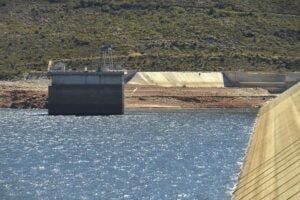The plant was one of three that formed part of the City's response to the severe drought.

The City of Cape Town has asked the Western Cape High Court to dismiss legal action launched against it by the company that built a desalination plant at the V&A Waterfront.
Quality Filtration Systems (QFS) filed court papers in June, suing the City for alleged breach of contract valued at more than R50 million, plus damages, over a plant it was commissioned to build at the height of Cape Town’s drought.
QFS claimed the City had “deliberately or negligently” withheld information about sewage contamination of seawater in tender information in November 2017 for the building of the desalination plant at the Waterfront.
In responding court papers, the City said although QFS had written to the City in May to cancel its contract and to notify the City of its intention to launch legal action for damages, the company had failed to write to the municipal manager to tell him this.
This was in contravention of the Legal Proceedings against Certain Organs of State Act (Legal Proceedings Act) and meant that the company was therefore barred from taking legal action against the City.
The City asked the court to dismiss QFS’ application with costs, including the cost of two counsel.
The plant was one of three that formed part of the City’s response to the severe drought when Cape Town faced the prospect of the taps running dry.
QFS argued in court papers that the City had been aware that the seawater in the uptake area at the waterfront was contaminated by sewage and that it was also aware that the tender specifications given to companies wanting to build the desalination plant were inadequate to purify seawater contaminated by sewage.
The City has denied this. It said in replying papers that the information in the tender document about raw seawater quality was to give an indication only of the water quality on those days when it had been sampled.
The City said the tender document stipulated that there was a lot of variation in seawater quality and that the tenderer must, therefore, design a desalination plant robust enough to cope with this variation. It said the tenderer was responsible for “validating and verifying the existing water quality”.
The City also said the tender document made it clear that the City “shall have no responsibility for the accuracy, sufficiency or completeness” of the environmental data at the V&A Waterfront site where the desalination plant was to be built.
The City denied in papers that it had been aware that the seawater in the uptake area was contaminated with sewage, that it had failed to inform QFS about this, and that its tender specifications were inadequate to purify water contaminated with sewage.
The City also denied that it had withheld objections from independent scientists about the specifications in the tender document, as well as withholding water test results.
QFS has said it had to make alterations to its desalination plant once it found that the seawater was at times 400% dirtier than the specifications.
Once this had been done, at an extra cost of R7 million, it was able to produce water for the City to the required national standards – SANS241.
The City said in papers “this is denied”, and said the water produced was not SANS241 compliant until May 28, 2018.
It also denied that it had “failed or refused” to buy water from QFS. Between May 28 and September 4, it had bought on average 0.33 million litres a day, and an average of one million litres a day until the end of January.
QFS has said that after it had built the desalination plant, the City issued it with new purification levels of a higher standard – those that would be required for the purification of water contaminated by sewage. QFS has said this was a breach of contract.
The City denied that these were amended purification levels, but said they were required by SANS241. It was therefore not in breach of contract.
QFS has said as a direct result of the City’s misrepresentation, it suffered damages of R58.4 million, which included capital investment of the plant, further capital investment to upgrade the plant to purify sewage, non-payment for water produced and loss of profit as agreed in the fixed term agreement.
The City replied in papers: “This paragraph is denied.”
For more news your way, download The Citizen’s app for iOS and Android.






